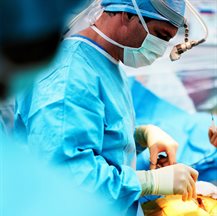Bowel cancer and emergency surgery survival in Southampton among best in country
Nationally, 96.8% of patients survive a month after surgery compared to 99.2% for those operated on at University Hospital Southampton – with 86% still alive two years later.
Bowel – or colon – cancer is the fourth most common cancer in the UK with 42,000 new cases diagnosed and 16,000 deaths every year.
“Cancer in the colon can be difficult to treat effectively and the diagnosis can be devastating to patients and their families,” said James Kirkby-Bott, a consultant general surgeon and director of clinical outcomes at UHS.
“However, patients with colon cancer in Southampton are getting some of the best care in the country with a survival rate better than most other cancer units in the UK and we are extremely proud of that.”
He added: “UHS is also the only centre in the UK where targeted radiotherapy can be delivered at the same time as surgery using a revolutionary mobile machine known as Mobetron, which is funded by the cancer charity PLANETS.
“These innovations, combined with the quality of care provided, are what ensure we can keep pushing the boundaries and perform at the highest standards for our patients.”
Other developments in surgery introduced at UHS include an acute surgery service which was established in 2013 to provide consultant-delivered care to patients presenting urgently to hospital with abdominal problems that were traditionally seen by junior surgeons.
The acute surgical team are assessed on the success of emergency laparotomy, a procedure carried out to establish urgently the cause of potentially life-threatening abdominal pain – this can be as a result of bowel obstruction, perforation or internal bleeding.
From the changes made through the development of the unit, survival from this surgery is also better than the national average, with around 10 more patients surviving every year than are expected to based on the severity of their conditions.
“By engaging senior clinicians and our intensive care unit in high-risk cases, we are ensuring good outcomes,” explained Mr Kirkby-Bott, who has launched a new blog to show how services are delivering quality care.
“It is impressive to look at how many additional lives have been saved by the team and it shows that having an emergency laparotomy at UHS is overwhelmingly safe.”
